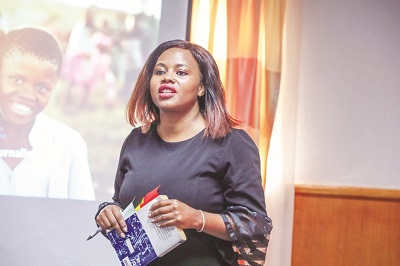By Thandiwe Kubere
MASERU – World Vision Lesotho held a three day workshop with the purpose of training journalists on how to properly and sensitively report issues relating to trafficking in persons in a way that protects the rights of those who have been affected, the right approach to people with disabilities as well as ensuring the promotion and protection of children’s rights.
Opening the event, the National Director of World Vision James Chifwelu, extended his gratitude to relevant partners for making the workshop possible. He mentioned the significance of the workshop being that media has an important role to play in informing the society, hence it is important to cover in a way that promotes and protects human rights.
As part of the organization’s core values of ensuring that hope is restored to those whose rights have been marginalized, World Vision Lesotho is currently running a promotion and protection of human rights project. This was described to be a three-year initiative, spanning from 2023 to 2026, which holds the potential to create a profound impact on the lives of vulnerable communities in Lesotho. The geographical coverage of the project encompasses seven districts, which are; Mokhotlong, Leribe, Berea, Maseru, Mafeteng, Mohale’s Hoek, and Quthing.
The ultimate goal of this project is to fortify the organization’s social protection systems, particularly in monitoring, preventing, and responding to trafficking in persons and safeguarding the rights of people with disabilities.
Media, is undoubtedly instrumental in disseminating key messages to the society. With that, Chifwelu said, “Today, as we gather with journalists from various media houses, MISA, LNFOD, Beautiful Dream Society, and dedicated staff from World Vision International Lesotho, our objective is clear: to build the capacity of local journalists on the crucial issues of trafficking in persons and the rights of people with disabilities. Through this training, we aim to empower journalists to report sensitively and effectively on the two outcomes of the PPHR Project”.
The first anticipated outcome of the project focuses on the establishment and strengthening of children’s clubs, Community Council Child Protection Teams (CCCPTs), Congregational Hope Action Teams (CHATs), Auxiliary Social Workers, and relevant community leaders. This will be done by involving key actors and utilizing the Systems Approach Model, which seeks to address the issue of trafficking in persons more comprehensively, with more emphasis on prevention. The outcome aims to directly benefit 8,710 individuals, being members of the aforementioned groups, and 8,000 community members.
On the other hand, the second outcome centers on empowering LNFOD on applying Citizen Voice and Action (CVA) skills. “Through CVA, we aspire to foster collaborative dialogues between citizens and the government in order to promote and protect the rights of People with Disabilities (PwDs). This outcome seeks to benefit 2,500 PwDs, facilitating a stronger voice for their rights and improved service delivery”, said Chifwelu.
He further emphasised that collaboration is key to the success of this project, and a meaningful engagement between government departments, civil society organizations, media houses, and community leaders is envisioned for the success of this project which aims at making Lesotho a nation where everyone’s rights are considered and respected. He added that by equipping journalists with essential skills of reporting, competencies, and knowledge, they can play a pivotal role in monitoring, help in preventing and responding to trafficking in persons, as well as ensuring that the rights of people with disabilities are not violated.
“As we embark on this important journey together, let us recognize the significance of our collective efforts in transforming lives and upholding human rights. By shedding light on the challenges faced by the vulnerable, we can become catalysts for positive change. As you undergo this training, I urge you to approach these topics with sensitivity, accuracy, and a commitment to ethical journalism. Your stories have the potential to shape perceptions, influence policies, and ultimately create a safer, more inclusive Lesotho. ” he said. The responsibility of journalists is not only to report but to advocate for those whose voices often go unheard.
World Vision Lesotho Communications and Managing Director Lerato Brown explained media’s role to be significant in that it holds the narrative, and through reporting, Journalists have the power to bring to attention the outrages of trafficking and the rights of people with disabilities. The words and language used can inspire empathy, understanding, and action. Journalists were therefore urged to be careful and pay extra attention in their reporting as they shape the public’s perception.
Lerato Brown deliberated that if people can normalise unapologetically coming out with their stories, regardless of barriers and definitions of the society of how one should carry themselves, in a way that their dignities and lives are protected, the world would be a much better place. She therefore urged journalists to uphold the responsibility of ensuring that their reporting does not endanger the lives of the vulnerable, by disclosing their names, location, pictures or any information that can alert their perpetrators.
Talking on human rights, she quoted UN universal declaration of human rights which states, “All human beings are born free and equal in dignity and rights. They are endowed with reason and conscience and should act towards one another in a spirit of brotherhood. Everyone has a right to life, a minimum level of security, freedom from torture, slavery and servitude, and other acts which impinge on human dignity.”
Concluding, Mr. Chifwelu further thanked the European Union for funding the PPHR project. “Together, we can empower communities to prevent trafficking, protect the rights of People with Disabilities, and build a nation where human rights are respected, cherished, and upheld by all. The path ahead may be challenging, but with our collective determination and unwavering commitment, we can make a difference. Let us begin this journey together, knowing that we hold the power to effect lasting change for a better, more just Lesotho.”


